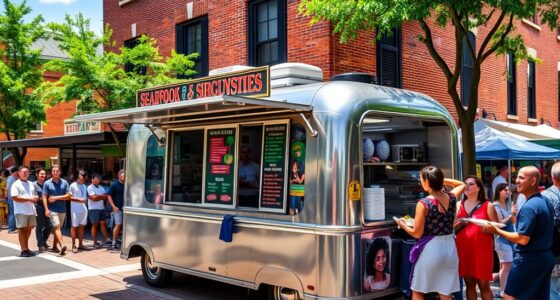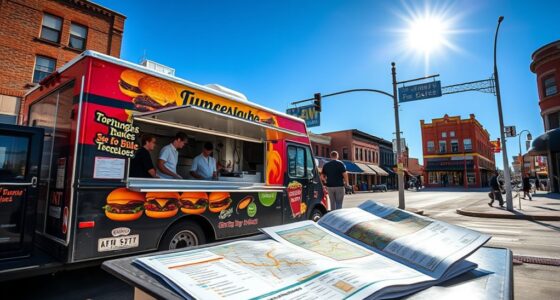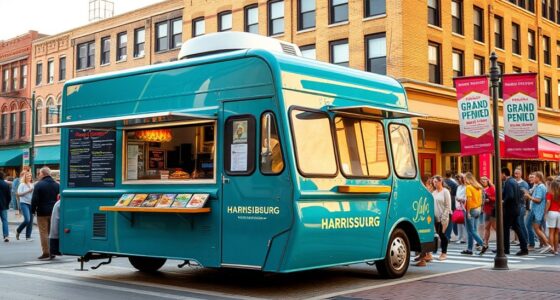To open a food truck in Huntsville, you need to secure permits from the Alabama Department of Public Health and the local city, plan your budget for trucks costing $70,000 to $150,000, and find prime spots like downtown festivals or parks. Develop a compliant menu with safe ingredients, and use social media for marketing. To succeed, you’ll want to guarantee safety standards and location choices—keep exploring to learn how all these pieces come together.
Key Takeaways
- Obtain necessary permits from the Alabama Department of Public Health and Huntsville business license at least 3 weeks before opening.
- Budget $50,000–$150,000 for a fully equipped truck, including permits, equipment, initial inventory, and routine costs.
- Target high-traffic locations like festivals, parks, downtown districts, and university areas with proper permits and environmental considerations.
- Develop a compliant menu sourcing ingredients from approved suppliers, emphasizing quality, safety, and regional appeal.
- Use social media and local events to market your food truck, build brand recognition, and attract repeat customers.
Navigating Permits and Licensing Requirements in Huntsville
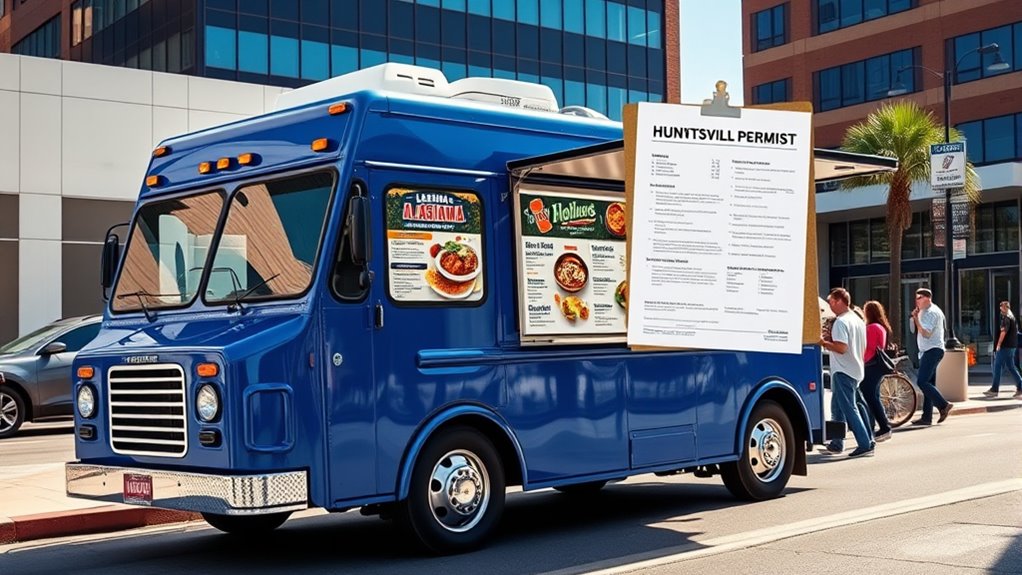
Going through permits and licensing requirements in Huntsville can seem complex, but understanding the key steps makes it manageable. First, you need a Mobile Food Unit Permit from the Alabama Department of Public Health. Each mobile unit requires separate approvals for each county you plan to operate in, and the health officer may impose extra rules to ensure safety. Your unit must follow food safety standards, like maintaining proper temperatures and using an approved commissary for cleaning and waste disposal. Additionally, you’ll need a Huntsville business license before opening, which involves submitting an application and paying fees. If you plan to serve alcohol or operate at festivals, extra permits or licenses are necessary. Starting the process at least three weeks before your launch ensures you meet all health inspections and legal requirements. Considering projector technology can also help if you plan to create a multimedia presentation for promotional events or vendor demonstrations.
Understanding the Costs Involved in Starting Your Food Truck

Starting your food truck business involves more than just obtaining permits and licenses; understanding the costs involved helps you plan effectively. The initial vehicle purchase is a significant expense, with new fully equipped trucks in Alabama costing between $75,000 and $150,000+, depending on customization. Used trucks offer savings, typically $70,000 to $80,000, but may require repairs. Food trailers tend to range from $50,000 to $100,000. Equipment and inventory costs also add up—kitchen appliances can be substantial, and initial food and beverage stock usually runs $2,000 to $3,000. Vehicle customization and build quality also significantly influence the total investment. Ongoing expenses include maintenance ($500–$1,500 annually), fuel ($1,200–$2,000 for propane), insurance, permits costing $100–$500 annually, and marketing efforts to attract customers. Proper budgeting guarantees your food truck launch is financially sustainable.
Finding Prime Locations for Mobile Food Operations
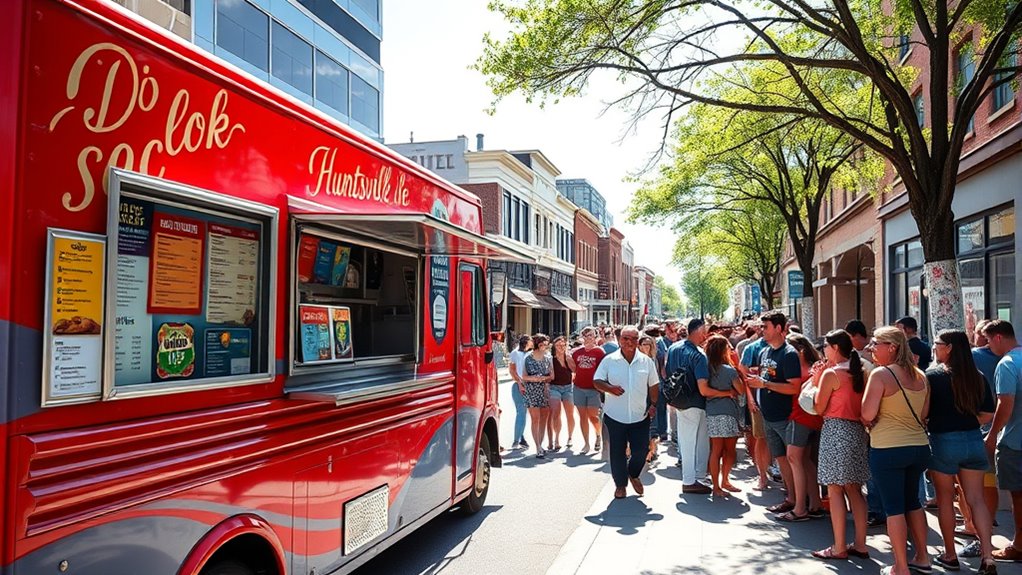
To find prime spots for your food truck, consider attending downtown festivals and events that draw large crowds. Business districts and popular parks also offer consistent foot traffic, boosting your chances of steady sales. By targeting these high-traffic areas, you can maximize visibility and customer engagement for your mobile operation. Additionally, researching cost and budgeting factors can help you select affordable locations that fit within your financial plan.
Downtown Festivals and Events
Downtown festivals and events in Huntsville offer prime opportunities for mobile food operations to reach large, diverse audiences. Events like the Juneteenth Festival at Big Spring Park and the Panoply Arts Festival draw significant crowds looking for culinary variety. Smaller recurring festivals, such as The Market at MidCity, also attract foot traffic, giving you chances to test menus and build a customer base. High-traffic spots near main stages, entrances, or interactive zones maximize visibility, though they may come with higher fees. Participating requires applying well in advance and securing necessary health and business permits. Some events provide curated vendor zones, helping your truck stand out. These festivals increase exposure, boost sales, and connect you with the community, making them ideal for new or expanding food truck businesses. Additionally, 2026’s Panoply Arts Festival, scheduled for April 24-26 in downtown Huntsville, is expected to draw large crowds, making it a particularly valuable event for mobile food vendors seeking maximum visibility.
Business District Hotspots
Are you aware of the key locations within Huntsville’s business districts that can maximize your food truck’s visibility and sales? Operating in designated downtown zones, like the Church Street area, guarantees legality and steady customer flow. Expanding beyond downtown is encouraged, especially near office parks, healthcare facilities, and universities, which generate high lunchtime traffic. Shopping centers and retail districts also offer excellent customer volume. Being near breweries, outdoor dining venues, or entertainment spots can boost sales during events and evenings. For success, choose streets with pedestrian access and parking. Remember, you must comply with zoning laws, obtain necessary permits, and coordinate with property owners or city officials to guarantee legal operation. Food trucks can also benefit from participating in local events and festivals to increase exposure and attract diverse crowds. Strategic location selection is vital for building a loyal customer base and maximizing revenue. Additionally, understanding the permitting process and associated costs ensures smooth operation and avoids legal issues.
Parks and Recreation Areas
Looking for prime locations to maximize your food truck’s visibility? Huntsville’s parks and recreation areas offer excellent opportunities. With over 65 parks covering more than 3,000 acres, you can find spots that suit your target crowd. Monte Sano State Park attracts hikers and nature lovers, providing high foot traffic. Big Spring Park’s central location and festivals like Panoply Arts Festival draw large crowds, ideal for vending. Parks like Hays Nature Preserve and Brahan Spring Park attract outdoor enthusiasts, families, and sports fans. Parks with playgrounds, pavilions, sports fields, and accessible amenities support consistent patronage. To operate legally, you’ll need permits from the city and coordination with park management. Peak times include weekends, holidays, and during community events, maximizing your sales potential. Additionally, Monte Sano State Park’s scenic overlooks and lush forested areas can provide a unique backdrop that appeals to visitors seeking a scenic dining experience. Incorporating cultural and regional breakfast options into your menu can also attract a diverse array of customers during these high-traffic times.
Crafting a Compliant and Appealing Menu
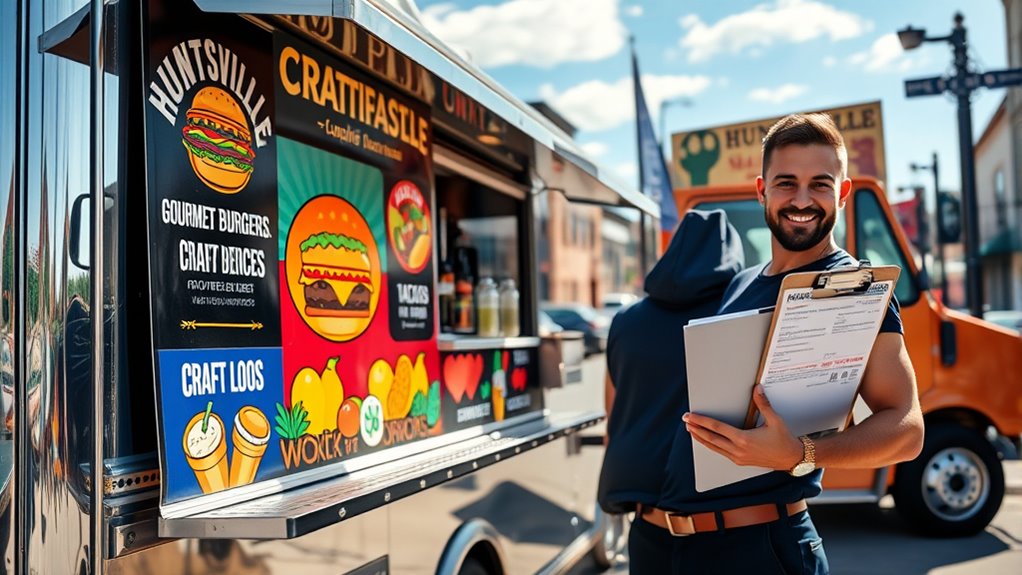
To create a menu that meets Alabama’s food safety regulations, you need to understand the restrictions on food types and preparation methods. Sourcing high-quality ingredients from approved suppliers not only guarantees safety but also appeals to customers. By balancing compliance with ingredient quality, you can craft a menu that’s both safe and irresistible. Incorporating vetted textile lines can also inspire creative packaging and branding for your food truck.
Menu Restrictions and Compliance
Crafting a compliant and appealing menu for your Huntsville food truck requires careful attention to local health regulations and menu item restrictions. You must select foods that meet safety standards, avoid raw or high-risk items unless approved, and ensure proper storage and handling. Using pre-cooked, pre-packaged, or fully prepared ingredients simplifies compliance and reduces risks. Temperature controls are essential: hot foods must stay above 135°F, cold foods below 41°F. Here’s a quick overview:
| Food Item Type | Allowed/Restricted | Notes |
|---|---|---|
| Raw seafood (not pre-wrapped) | Restricted on pushcarts, limited on self-propelled vehicles | Strict handling restrictions |
| Reheated high-risk foods | Allowed with proper equipment and temperature control | Must meet safety standards |
| Pre-packaged foods | Allowed from all mobile units | Check permits for specific items |
Additionally, understanding food safety procedures is crucial to maintaining compliance and protecting public health. Following these guidelines ensures safety and smooth compliance. Additionally, all menu items must be prepared and served in accordance with Huntsville health department regulations, which may include specific labeling, ingredient disclosure, and handling procedures to ensure public safety.
Ingredient Quality and Sourcing
Choosing high-quality ingredients is key to developing a menu that’s both compliant and appealing to customers. To do this, use a mix of wholesale suppliers, bulk stores, and local markets to balance cost and freshness. Wholesale suppliers like Sysco provide cost-effective options with reliable bi-weekly deliveries, while specialty stores are great for seasonal or unique ingredients that highlight local or healthy offerings. Establish multiple sources for each ingredient to ensure consistent stock and avoid shortages. Implement routine inspections of all incoming ingredients to maintain quality standards, and develop clear handling protocols on your truck. Prioritize sourcing from local farmers practicing sustainable methods to support freshness and eco-friendly practices. Regularly monitor inventory, use leftovers creatively, and coordinate flexible deliveries to keep your menu reliable and appealing. Additionally, understanding the effectiveness of eye patches can inspire you to incorporate health-conscious, skin-friendly ingredients into your menu offerings that promote wellness and customer satisfaction.
Effective Marketing Strategies to Grow Your Food Truck Business
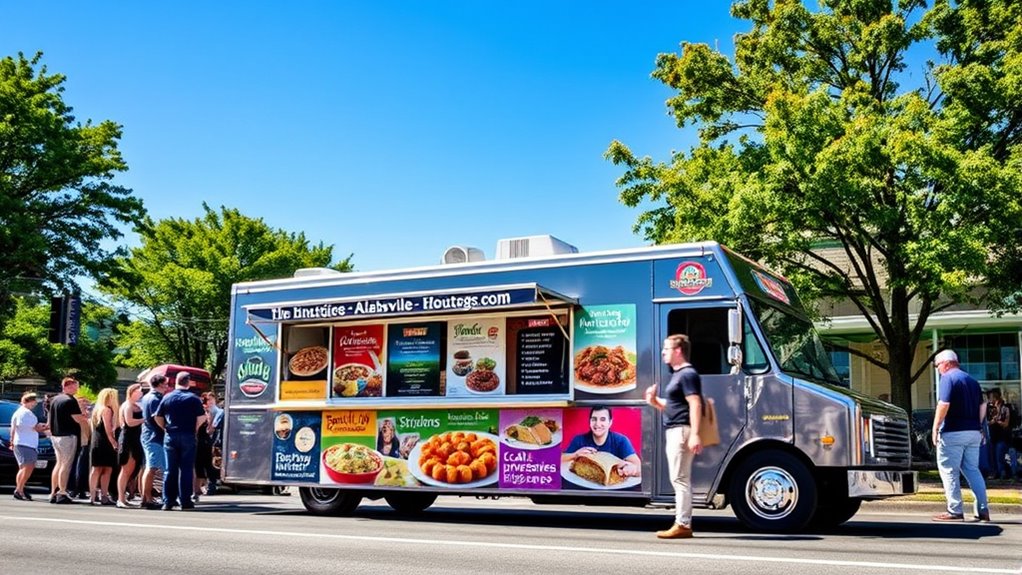
Implementing effective marketing strategies is essential for growing your food truck business and standing out in a competitive landscape. Social media is a powerful tool; 68% of food trucks use it regularly, with Facebook being the top platform for 75%. Smart social campaigns can boost sales by 20%, and active engagement encourages customers to spend about 15% more. Participating in festivals and local events, which 80% of trucks do, is a proven way to increase visibility and attract new customers. Loyalty programs and email marketing help retain customers, with over half of trucks seeing a 30% rise in repeat visits. Using GPS tracking and location-based marketing makes it easier for customers to find you, while digital content like videos further enhances your brand presence. Additionally, understanding the importance of Personality Traits can help tailor your customer interactions and marketing messages to foster stronger relationships.
Maintaining Health and Safety Compliance on the Go
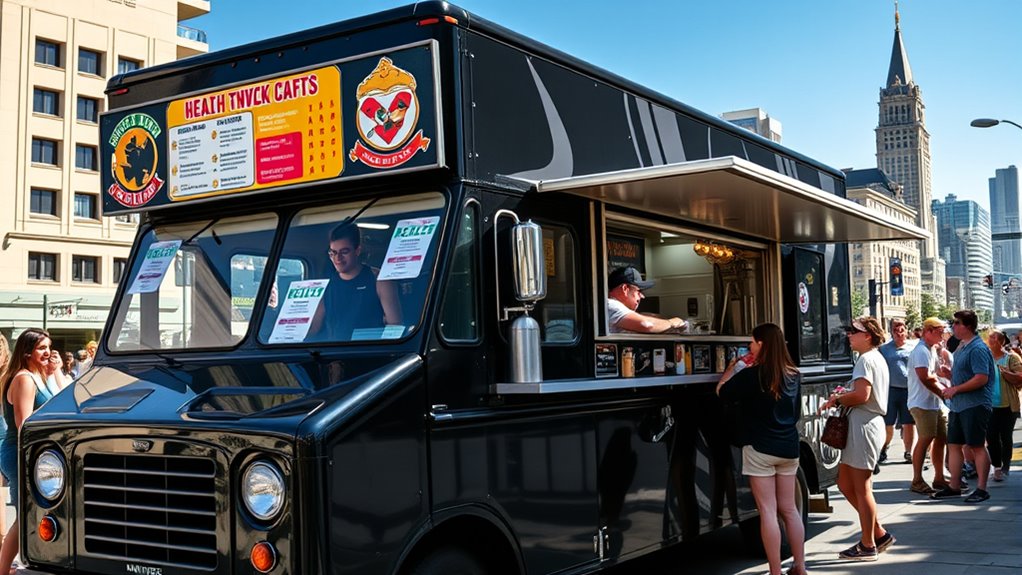
Staying compliant with health and safety regulations while operating your food truck requires diligent attention to specific requirements set by the Alabama State Board of Health. You must obtain county-specific approval before launching, as approval in one county doesn’t cover others. Prepare and submit a detailed plan of operations covering your menu, food prep, temperature control, handwashing, and service methods for approval. Ensure your truck has a handwashing station with hot and cold water, utensil washing capabilities, and overhead protection like umbrellas if needed. Strict temperature control for TCS foods, proper waste disposal, and protection from environmental contaminants are essential. Also, operate in conjunction with a permitted commissary that supplies water, storage, and waste services. Regular inspections and staff training on hygiene and safe handling are critical to stay compliant on the go. Additionally, maintaining proper ventilation and ensuring all safety equipment is functional helps prevent hazards and supports compliance.
Frequently Asked Questions
How Long Does the Permit Approval Process Typically Take in Huntsville?
The permit approval process in Huntsville usually takes about 28 calendar days once you submit a complete application. You should plan to submit your paperwork at least 3 weeks before your planned opening or event to give enough time for review and inspections. Delays happen if your application is incomplete or if inspections uncover compliance issues, so make sure to prepare detailed plans and documentation upfront.
Are There Any Restrictions on Operating Hours for Food Trucks in Huntsville?
Imagine a city that’s more modern than a steam engine—Huntsville limits food truck hours to keep things smooth. You can operate from 6 a.m. to 10 p.m. Sunday through Wednesday, and until 11:30 p.m. on Thursdays. Nighttime hours are restricted unless you partner with special venues or events. Always get approval from the Health Officer first, and follow local rules to avoid fines or shutdowns.
Can I Operate a Food Truck Without a Commissary in Huntsville?
You can’t operate a food truck without a commissary in Huntsville, Alabama. State regulations require mobile food units to operate out of an approved commissary for daily restocking, cleaning, and servicing. Without this agreement, your permit is invalid, and you can’t legally run your truck. Alternative options like home kitchens or off-site storage don’t meet health standards, so securing a commissary is essential for lawful operation.
What Are the Specific Health Code Violations That Could Delay My Permit Approval?
Your permit approval process can hit a snag if health code violations act like hidden landmines. Common issues include improper food temperatures, like salads kept too warm or meats undercooked, which invite bacteria. Sanitation lapses, such as dirty equipment or unclean ice machines, also cause delays. Pest infestations or unsecured waste attract unwanted guests. Plus, missing documentation, like food safety training or maintenance records, signals you’re unprepared, risking permit approval.
How Do I Renew My Permits and Licenses Annually in Huntsville?
You need to renew your permits and licenses annually in Huntsville by using the online Business License Renewal portal or submitting a paper form. You’ll receive renewal notices in December, and a valid Taxpayer ID is required. For health permits, submit renewal applications before September 30, and guarantee inspections are up to date. Keep all documentation current, pay renewal fees on time, and update any major changes to avoid delays.
Conclusion
Starting a food truck in Huntsville is an exciting venture, but remember, compliance and location are key. Did you know that mobile food vendors see a 20% higher sales increase when they actively market on social media? By steering permits, selecting prime spots, and crafting an appealing menu, you’ll set yourself up for success. Stay focused on health and safety, and watch your business grow in this vibrant city.


